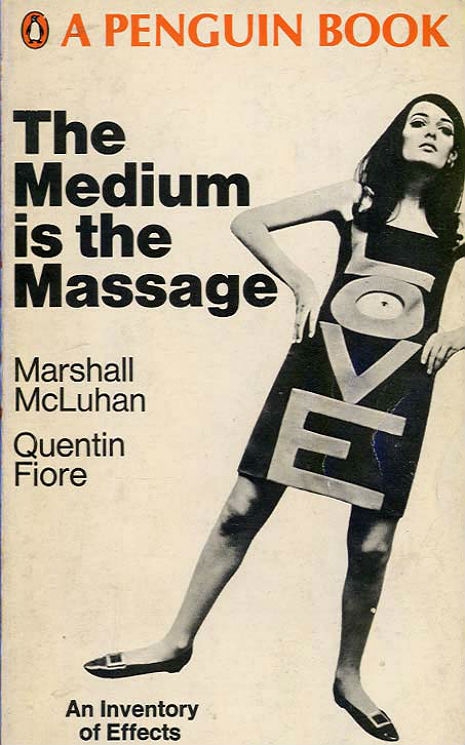
In the 60s and the 70s, Marshall McLuhan, the pithy and eminently quotable Canadian philosopher of media and electronic communications occupied a rarefied niche (along with R. Buckminster Fuller) that really doesn’t seem to exist much in American culture anymore, that of the “public intellectual.” More to the point, McLuhan, who never met a TV camera he didn’t take an immediate liking to, was an intellectual celebrity.
Marshall McLuhan was once such a ubiquitous part of the media landscape that you could turn on the TV and see him hamming it up on the Today show or read Sunday funnies where cartoon characters debated his ideas. McLuhan even appeared as himself, employed as a human punchline in Woody Allen’s Oscar-winning Annie Hall. These days only someone like Slavoj Žižek has anything even close to that same sort of “smart guy” star power, but it’s difficult to imagine NBC devoting an entire hour to his work, like they did with 1967’s This Is Marshall McLuhan: The Medium Is the Massage.

An episode of the NBC Experiment in Television series, this was in fact pretty experimental stuff. A quasi-documentary cum visual essay (based on McLuhan and graphic designer Quentin Fiore’s best-selling coffee table book, The Medium is the Massage: An Inventory of Effects) it was heady and decidedly avant garde programming for middle America in 1967. Just how avant garde was it you ask? Well, it’s got Nam June Paik and Charlotte Moorman in it for starters. She’s not playing her cello topless here of course, but is seen wrapped in plastic. Artist Allan Kaprow, father of “the Happening” also makes an appearance. There’s a long quoted passage from John Cage and the piece is littered with Pop art trappings and evocative visuals. The producers, Ernest Pintoff and Guy Fraumeni, were obviously making a sincere effort to be forward-thinking. And it was, and is still very much a satisfying viewing experience nearly half a century later. The only thing I can think of today that would be similar in any way would be one of Adam Curtis’ films. (There’s one section where the VO discusses how all pervasive the mediasphere is on all of our lives while onscreen hands are seen kneading dough as a stand-in for our collective brains. It practically screams Adam Curtis.)
McLuhan reveals that many of the subjects he investigates are things that he in fact finds irritating and exasperating, causing him to wish to mentally “take apart” things like television and radio. It’s might seem counterintuitive to view him as a Luddite, yet here he all but describes himself that way (which makes him even more fascinating, if you ask me.)

Topics include the “causes” of go-go dancing and “the discothèque,” the passing of one style of humor in favor of one favored by younger people (Bill Cosby, Bob Newhart and Bill “My name — José Jiménez” Dana are shown as examples of the new!), how politics had become show business, why teens often seek out corporate involvement for their fashion trends, the influence of the Beatles, Federico Fellini, Ingmar Bergman and Pablo Picasso, how images of abundance (things as commonplace to us as refrigerators) seen worldwide via our television programs would have inevitable and far-reaching consequences in poorer nations who would perceive themselves as deprived of something which they would then aspire to.

The Velvet Underground and Nico make an appearance in McLuhan and Fiore’s book in this two page spread.
We hear McLuhan’s blunt musings on the Vietnam War, the first televised war, which the nation was then in the middle of. Also touched upon is how the media revolution would eliminate entire classes of jobs. That would have seemed an eerie thought at the time, a sci-fi prediction if you will, but flash forward to today and we’re living in that future.
As Tom Wolfe once asked “What…if…he…is…right?” In retrospect, McLuhan was right about practically everything! From the perch of nearly fifty years ago, he was extraordinarily prescient. His track record as a futurist is much better than… well, anyone’s, when you get right down to it.

You’ll notice that one of his critics puts McLuhan’s ideas in the same “popular with young people” context as Lord of the Rings, which by the mid-60s had become an absolute cultural phenomenon (and the second best-selling book of all time). Like Tolkien’s Middle Earth, McLuhan was a very, very big deal and this fascinating film is a testament to his enduring influence. It’s a tad washed out but nevertheless, this was made from a sharp film print. It’s had fewer than 900 views on YouTube so far which is ridiculous.

As a bonus, here’s McLuhan and Quentin Fiore’s The Medium Is the Massage LP. This is one of the most amazing things you’ll ever hear. It’s an extremely innovative audio collage art form to have been birthed by a middle-aged academic. This came out in 1968 with the paperback edition of the book, and should be thought of as its soundtrack (of sorts). The two items are considered to be one of the first multi-media publications.
I’d put The Medium Is the Massage in the same category as, the Beatles’ “Revolution #9” or even Firesign Theatre. It should be in every introductory class about the history of electronic music. It’s very Mad Lib in its way, I think you’ll agree (I can only imagine this record has place of pride in his gigantic two-story record collection.) Credited to Marshall McLuhan, Quentin Fiore, John Simon, producer (yes, the same John Simon who worked with The Band and Simon and Garfunkel). Conceived and coordinated by Jerome Agel.
Be warned that this isn’t something that you can put on in the background and listen while you surf the Internet, it’ll just seem annoying, chaotic and cacophonous unless you’re actually paying attention to it.